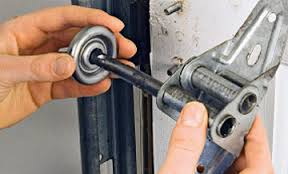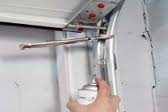While some garage door wear is unavoidable, damage can (sometimes) be prevented. To know what causes garage door damage is to gain control and – at least, more often than not, have the power to do something about it before things get out of hand. This is something nobody wants, when it comes to garage doors.
Today, we are not talking about garage door problems – although some of them can also lead to damage. We are talking about broken garage doors – not about wear but tear. About damage that may necessitate the replacement of the garage door. Ready to find out the main reasons for garage door damage?
Problems with the garage door tracks
 Garage doors slide on the tracks – thanks to the rollers. And so, it’s fair to assume that even minor problems with the garage door tracks and rollers will have serious effects on the door’s movement – let alone serious problems. When the tracks are not aligned or not aligned correctly, chances are high that the garage door will bind or come off. When this happens, expect serious damage.
Garage doors slide on the tracks – thanks to the rollers. And so, it’s fair to assume that even minor problems with the garage door tracks and rollers will have serious effects on the door’s movement – let alone serious problems. When the tracks are not aligned or not aligned correctly, chances are high that the garage door will bind or come off. When this happens, expect serious damage.
How to prevent this from happening? By quickly calling a technician if you notice any problem with the garage door tracks. Also, by entrusting the job to experts only.
Broken garage door springs
Garage door springs and cables snap when they are old and worn. Now, several bad things may happen when this happens.
- For starters, if the torsion spring snaps when the garage door is in its opening position, it will fall – and break.
- If one of the extension springs snaps, the garage door will sag to the side – with all the repercussions that come along.
- If the springs are not adjusted correctly, the garage door will not be properly balanced and, once again, will sag to the side.
- Something similar will happen when the garage door cables snap or even come off. Or when new cables are installed and the garage door is not level.
When the garage door is imbalanced, it leaves a small gap from the floor on one side. If this is not fixed quickly, the garage door may still work – although not well, but it will be eventually worn and torn.
Garage door opener malfunctions
Some of the most significant components of all electric garage door openers are the safety sensors. Their job is to stop and reverse the descending garage door if they sense something/someone under it. When they don’t work right or the photo eyes are misaligned, the garage door won’t stop descending even if your car is parked underneath it – let alone you. Bus since we are not talking about accidents right now, the focus is on the damage that will be inflicted on both the car and the garage door.
Lack of lubrication
 Consider lubricants the protective layer between garage door parts. Take the garage door rollers, for example. If they are not lubricated, they will make noise when they glide on the tracks. Right? And while this is incredibly annoying, the worst part is that they will gradually cause damage to the point that some parts may become eventually rusty.
Consider lubricants the protective layer between garage door parts. Take the garage door rollers, for example. If they are not lubricated, they will make noise when they glide on the tracks. Right? And while this is incredibly annoying, the worst part is that they will gradually cause damage to the point that some parts may become eventually rusty.
Bad weather & other external factors
Damage can be inflicted by heavy objects or by backing the car. Also, due to the bad weather. It’s not a coincidence that all garage door experts suggest lubricating before the cold starts. The springs, for instance, may brittle and break if they are not lubricated, due to the low temps.
Sometimes, the situation can really get out of hands. That’s in hurricane prone regions, where the wrath of nature can be revealed in all its magnitude. This is, perhaps, the only time when you can do little about it, apart from getting an impact rated hurricane garage door and making sure it’s maintained and everything works just fine. Even still, if the winds are high in your area and the hurricane comes close by, damage is almost certain. And there’s one more form of damage – the one that happens due to the floods created during the hurricane season. In such circumstances, you have no power. In all other cases, you do.






